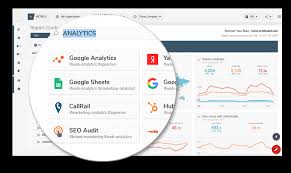The Power of SEO Web Analytics
Search Engine Optimization (SEO) is crucial for any website looking to increase its online visibility. However, simply implementing SEO strategies is not enough. To truly understand the effectiveness of your SEO efforts and make informed decisions, you need to leverage the power of web analytics.
What is SEO Web Analytics?
SEO web analytics involves tracking, measuring, and analysing data related to your website’s performance in search engine results. By using tools such as Google Analytics, you can gain valuable insights into how users find your site, what keywords they use, how long they stay on your pages, and much more.
The Benefits of SEO Web Analytics
Improved Decision Making: By analysing data from web analytics tools, you can make data-driven decisions to enhance your SEO strategy. You can identify which keywords are driving traffic to your site and optimise your content accordingly.
Performance Tracking: Web analytics allows you to track the performance of your SEO efforts over time. You can monitor changes in traffic, conversion rates, and other key metrics to see what is working and what needs improvement.
Competitive Analysis: With web analytics, you can also gain insights into how your competitors are performing in search engine results. This information can help you identify opportunities for improvement and stay ahead in the competitive landscape.
Key Metrics to Monitor
When it comes to SEO web analytics, some key metrics to monitor include:
- Traffic sources
- Keyword rankings
- Bounce rate
- Conversion rate
- Page load times
- Click-through rates (CTRs)
Conclusion
In conclusion, SEO web analytics is a powerful tool that can help you maximise the impact of your SEO efforts. By leveraging data-driven insights, you can make informed decisions to improve your website’s visibility and drive more organic traffic. Incorporate web analytics into your SEO strategy today and unlock the full potential of your online presence.
9 Essential SEO Web Analytics Tips for Boosting Website Performance
- Set up Google Analytics to track website traffic and user behaviour.
- Monitor key metrics such as organic search traffic, bounce rate, and conversion rate.
- Use tools like Google Search Console to analyse search performance and index coverage.
- Optimise website content based on keyword research and performance data.
- Implement proper URL structures and meta tags for better SEO visibility.
- Track backlinks to identify referring domains and strengthen link-building strategies.
- Regularly audit website performance to identify areas for improvement.
- Utilise heatmaps and user recordings to understand user interactions on the site.
- Stay updated with SEO trends and algorithm changes for effective analytics strategies.
Set up Google Analytics to track website traffic and user behaviour.
To enhance your SEO strategy effectively, it is crucial to set up Google Analytics to track website traffic and user behaviour. By utilising this powerful tool, you can gain valuable insights into how users interact with your site, which pages they visit most frequently, how long they stay on each page, and much more. This data is essential for making informed decisions to optimise your website for better search engine visibility and user experience. Tracking website traffic and user behaviour through Google Analytics is a fundamental step towards improving your SEO performance and achieving your online goals.
Monitor key metrics such as organic search traffic, bounce rate, and conversion rate.
Monitoring key metrics such as organic search traffic, bounce rate, and conversion rate is essential in understanding the effectiveness of your SEO web analytics strategy. Organic search traffic indicates the volume of visitors coming to your site through search engines, highlighting the success of your SEO efforts. Bounce rate reveals how engaging your website is to visitors, while conversion rate measures the percentage of visitors who take a desired action, such as making a purchase or signing up for a newsletter. By closely monitoring these metrics, you can identify areas for improvement and make data-driven decisions to optimise your website’s performance and enhance its visibility in search engine results.
Use tools like Google Search Console to analyse search performance and index coverage.
To enhance your SEO web analytics strategy, it is advisable to utilise tools such as Google Search Console to analyse search performance and index coverage. By leveraging the features of Google Search Console, you can gain valuable insights into how your website is performing in search engine results. This tool provides essential data on search queries, click-through rates, and index coverage, allowing you to make informed decisions to optimise your site for better visibility and ranking. By incorporating Google Search Console into your SEO toolkit, you can effectively monitor and improve your website’s search performance.
Optimise website content based on keyword research and performance data.
To maximise the effectiveness of your SEO strategy, it is essential to optimise your website content based on thorough keyword research and performance data analysis. By identifying the keywords that drive traffic to your site and analysing how well they perform, you can tailor your content to better align with user intent and search engine algorithms. This targeted approach not only enhances the relevance of your website but also improves its visibility in search engine results, ultimately driving more organic traffic and increasing overall performance.
Implement proper URL structures and meta tags for better SEO visibility.
Implementing proper URL structures and meta tags is a fundamental tip in SEO web analytics that can significantly enhance your website’s visibility. By ensuring that your URLs are descriptive, concise, and contain relevant keywords, you make it easier for search engines to understand the content of your pages. Additionally, optimising meta tags such as title tags and meta descriptions with targeted keywords can improve click-through rates and overall search engine rankings. These small yet crucial adjustments can make a big difference in how effectively your website is indexed and displayed in search results, ultimately driving more organic traffic to your site.
Track backlinks to identify referring domains and strengthen link-building strategies.
Tracking backlinks is a crucial aspect of SEO web analytics as it allows you to identify the referring domains linking to your website. By monitoring backlinks, you can gain insights into which websites are directing traffic to your site and assess the quality of these incoming links. This information is invaluable for strengthening your link-building strategies, as it helps you focus on building relationships with high-quality websites that can positively impact your search engine rankings and overall online visibility.
Regularly audit website performance to identify areas for improvement.
Regularly auditing your website performance through SEO web analytics is essential for identifying areas that require improvement. By monitoring key metrics such as traffic sources, keyword rankings, bounce rates, and conversion rates, you can gain valuable insights into how your website is performing in search engine results. This data-driven approach enables you to pinpoint weaknesses in your SEO strategy and make necessary adjustments to enhance your website’s visibility and overall performance. Consistent auditing allows you to stay proactive in improving your website’s SEO effectiveness and ensures that you are maximising the impact of your online presence.
Utilise heatmaps and user recordings to understand user interactions on the site.
To enhance your SEO web analytics strategy, consider utilising heatmaps and user recordings to gain a deeper understanding of user interactions on your site. Heatmaps provide visual representations of where users click, scroll, and spend the most time on your web pages. By analysing this data, you can identify patterns and areas of interest that can help improve user experience and drive conversions. User recordings offer valuable insights by capturing actual user sessions, allowing you to see firsthand how visitors navigate your site. By leveraging these tools, you can make informed decisions to optimise your website for better engagement and ultimately boost your SEO performance.
Stay updated with SEO trends and algorithm changes for effective analytics strategies.
To ensure the effectiveness of your SEO web analytics strategies, it is crucial to stay updated with the latest SEO trends and algorithm changes. By keeping abreast of industry developments, you can adapt your analytics approach to align with current best practices and maximise the impact of your efforts. Understanding how search engine algorithms evolve allows you to make informed decisions when analysing data and implementing changes to improve your website’s visibility and performance in search engine results pages. Stay ahead of the curve by staying informed about SEO trends and algorithm updates for a more effective analytics strategy.




